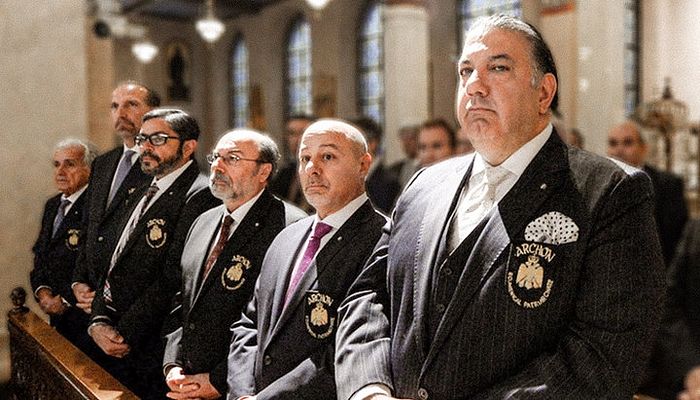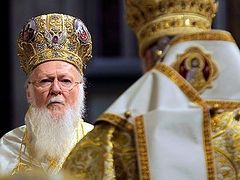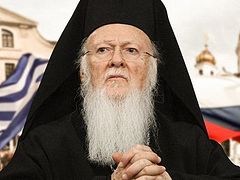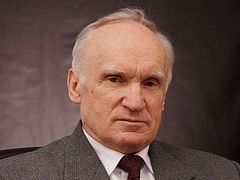What role do influential Greek clans play in strengthening the power of the Phanar and what do they have to do with Ukraine?
With the fall of Constantinople under the attack of the Ottoman Turks in 1453, significant changes occurred in the position of the Patriarchate of Constantinople: on the one hand, he went from being amongst the ruling elite to becoming only tolerated in the now Muslim country, but on the other hand, he was given administrative power over the Greek population (the Rum millet) in the Ottoman Empire— something rather unprecedented for the Patriarchate.
Rich laymen, who are [now] called Archons of the Patriarchate of Constantinople, began to exert great influence on the politics of Phanar. What is this organization doing today, who plays the leading roles in it, and what are its tasks?
The “Son of the Devil” and others
The conquest of Constantinople by the Turks made significant changes in the life of the Greek population. But not all of them were negative. Famous English historian Steven Runciman wrote:
“The Sultan also well understood that the Greeks could be of use to his empire. The Turks will provide it with rulers and warriors; but they lacked skills in trade and industry; few were good sailors; and even in the village, they were more pastoralists than farmers. Cooperation with the Greeks was essential for the economy of the empire. <...> One of the most unpredictable consequences of the Ottoman conquest was the revival of Greek trading life. <...> Few of the Turks had a penchant or taste for trade, and trade in the vast and growing possessions of the Sultan passed into the hands of subjugated peoples: Jews, Armenians, and above all Greeks. The Greek commercial genius has always flourished in areas where the Greeks have been stripped of political power, and thus their ambition and energy are channeled to commerce.”1
The Turks and Greeks created a very effective symbiosis: the Turks provided military and political cover, various preferences, and the Greeks made big money in these favorable conditions. Soon, very rich Greek dynasties were formed, in which from father to son passed not only capital, but also useful connections, as well as experience and knowledge in conducting commercial operations.
Representatives of such famous Greek dynasties as the Laskaris, Doukas, Argyros, Ypsilantis, Kantakouzenos, and others have played a very important role in history. Their riches are legendary. For example, in the sixteenth century, Michael Kantakouzenos was one of the richest people in the whole Near East. One of the descendants of the dynasty, Mikhail Kantakuzin-Speransky, in his book The Saga of Kantakuzin-Speransky gave him an interesting characteristic: “A trader of salt and Russian fur, a greedy extortionist in everything concerning his money (especially when he traded with the Turks for the removal of the patriarch Mitrophan), a cruel lender—he was called Şeytanoğlu—the Son of the Devil.”
Naturally, such rich Greeks, on the one hand, provided significant financial assistance to the Patriarchate of Constantinople, and on the other, acquired so much power in the Patriarchate that they could place Patriarchs on the throne, and remove them from it. For example, the very same Michael Kantakouzenos deposed Joasaph II, one of the most prominent Patriarchs of the Ottoman period, for not blessing him for a marriage that he coveted but that was contrary to church canons.
Over time, these rich Greek families began to build their homes near the Patriarchate of Constantinople in the Phanar region, and became known as Archons. This word itself is rather ambiguous. In ancient Greek city-states, the highest officials were called Archons. In the Byzantine Empire, it was a title for rulers, who nevertheless recognized the power of the Emperor. But in some places of the Gospel in the Greek original, the devil is called an Archon (άρχων) [translated as Prince in the KJV.—Trans.], (“άρχων του κόσμου τούτου”—the prince of this world”)2. And in Gnosticism, Archons were evil spirits.
A significant increase in the influence of the Archons on the affairs of the Patriarchate was facilitated by the fact that the Turkish authorities gave their permission for clergy to take higher church positions through the corrupt Berât system,3 from which the Turks made a lot of money. As Runciman writes, “by the end of the seventeenth century, the usual amount paid by the Patriarch upon his installment was around of 20,000 piastres—approximately 3,000 pounds of gold.”4
This money had to be taken from somewhere. And here the Archons with their capital came to the rescue. What this led to was eloquently described by one of the modern bishops of the Patriarchate of Constantinople, Metropolitan Kallistos (Ware), in his book The Orthodox Church:
“The Church’s higher administration became caught up in a degrading system of corruption and simony. Involved as they were in worldly affairs and matters political, the bishops fell a prey to ambition and financial greed. Each new Patriarch required a berat from the Sultan before he could assume office, and for this document he was obliged to pay heavily. The Patriarch recovered his expenses from the episcopate, by exacting a fee from each bishop before instituting him in his diocese; the bishops in turn taxed the parish clergy, and the clergy taxed their flocks. What was once said of the Papacy was certainly true of the Ecumenical Patriarchate under the Turks: everything was for sale.
When there were several candidates for the Patriarchal throne, the Turks virtually sold it to the highest bidder; and they were quick to see that it was in their financial interests to change the Patriarch as frequently as possible, so as to multiply occasions for selling the berat. Patriarchs were removed and reinstated with kaleidoscopic rapidity. ‘Out of 159 Patriarchs who have held office between the fifteenth and the twentieth century, the Turks have on 105 occasions driven Patriarchs from their throne; there have been twenty-seven abdications, often involuntary; six Patriarchs have suffered violent deaths by hanging, poisoning, or drowning; and only twenty-one have died natural deaths while in office.’5
The same man sometimes held office on four or five different occasions, and there were usually several ex-Patriarchs watching restively in exile for a chance to return to the throne. The extreme insecurity of the Patriarch naturally gave rise to continual intrigues among the Metropolitans of the Holy Synod who hoped to succeed him, and the leaders of the Church were usually separated into bitterly hostile parties. ‘Every good Christian,’ wrote an English resident in the seventeenth-century Levant, ‘ought with sadness to consider, and with compassion to behold this once glorious Church tear and rend out her own bowels, and give them for food vultures and ravens, and to the wild and fierce Creatures of the World.’6“7
Of course, the role of the Archons was not entirely negative. They allocated money for education, the purchase of books. Likewise, Michael Kantakouzenos gathered one of the richest libraries at that time, almost all of which was purchased by Athonite monasteries after his execution by the Turks.
Archons often paid for the education of Greek youths in European educational institutions, mainly Catholic. Indeed, in order to study there, in many cases it was necessary to convert to Catholicism, at least for the time of study.
And in the nineteenth century, during Greece’s struggle for independence, the Archons with their money and ties with the rulers of different countries, and influence on Greek society, contributed to the fact that Greece was in fact able to free itself from the power of the Turks. A descendant of the Ypsilantis clan, major general of the Russian army and adjutant of Emperor Alexander I, Alexander Konstantinovich Ypsilantis in 1821 led the Liberation War, which led Greece to gain independence.
Loyal Servants of the Phanar
In the 20th century, The Archon Society of the Patriarchate of Constantinople was institutionalized. On March 10, 1966, during the patriarchate Athenagoras I (the one who immediately after ascending to the throne declared that his main task was to promote American interests), the religious order of Archons was established—the Order of St. Andrew the Apostle. Its second name is the “Archons of the Ecumenical Patriarchate”.
The Order was created at the American Archbishopric of the Patriarchate of Constantinople in the form of a public non-profit organization. And in 1991, the Synod of the Patriarchate of Constantinople established a separate order for Archons living outside of America, the Brotherhood of [Archons of] the Most Holy Lady Pammakaristos”.
The spiritual mentor of the Order of St. Andrew is ex-officio the head of the American Archbishopric. Now, it is Archbishop Elpidophoros (Lambriniadis), the one who formulated the concept of the supremacy of the Patriarch of Constantinople, “First without Equals“.
Directly, the activities of the Order are led by a national commander. Now it’s Dr. Anthony J. Limberakis, MD. The governing bodies are also the Executive Committee and the National Council.
Each year, the Patriarch of Constantinople assigns the title of Archon to about two dozen candidates. The selection criteria, according to the procedure on archons.org,8 are as follows:
-
Does the candidate have a record of service to his local parish, metropolis, and the national Church?
-
Is the candidate willing and able to give of his Time, Talent, and Treasure, to the best of his ability, in advocating the cause of religious liberty for the Ecumenical Patriarchate and serve the needs of the Holy Mother Church?
-
Is he willing and able to speak to local, state, and/or federal officials in support of religious freedom for the Ecumenical Patriarchate?
-
Is the candidate willing and able to visit or participate in pilgrimages to the Ecumenical Patriarchate?
-
How can the candidate advance the cause of the Ecumenical Patriarchate?
It is easy to see that almost all requirements relate to devotion—not to Orthodoxy in general, but to the Ecumenical (Constantinople) Patriarchate. This list does not even formulate requirements for the moral character of the candidate.
It is not for nothing that the list of criteria indicates the candidate’s willingness to lobby for the Phanar’s interests with the US authorities. In 2006, the Order of the Archons initiated the draft Resolution on Religious Freedom, which was accepted by all US states except four.
From the title of this resolution, we might conclude that it is designed to affirm religious freedom in the states for all religious organizations, or at least Orthodox. But this is not so. The provisions of the Resolution concern only the assertion of the rights of Phanar before the Turkish authorities. In particular, the Turkish administration is required to acknowledge that the Patriarch of Constantinople has a “universal i.e. ecumenical status”, and is not only the head of the local “Fener” Orthodox community.
Epiphany Dumenko and “the First without Equals”
The Order of Archons was directly involved in the project of creating the Orthodox Church of Ukraine (OCU). Back in August 2018, when the Patriarchate of Constantinople did not decide on the creation of a OCU on the basis of two schismatic denominations of Ukraine, the Order of Archons stated that “it urges all Orthodox Christians to remember that the Ecumenical Patriarch has the right to grant a Tomos of autocephaly to the Ukrainian Orthodox Church, if he decides to do so.”
And in 2019, at the annual meeting of the Order in the United States, the head of the OCU, Epiphany Dumenko, was awarded the “Athenagoras Prize in the Field of Human Rights”. According to the description of the award on archons.org, it “is awarded every year at the annual banquet of the order to a person or organization that has consistently exemplified by action, purpose and dedication, concern for the basic rights and religious freedom of all people.”
It is rather cynical to present the prize for “caring for the fundamental rights and freedom of religion of all people” to the head of a religious organization whose followers seize churches of another denomination in Ukraine, beat bishops, priests and parishioners, and commit other atrocities.
At the presentation of the prize, Order Commander Anthony Limberakis noted, “the many years of experience of Metropolitan Epiphany in protecting the Ecumenical Patriarchate.” And the site archons.org reported, “Metropolitan Epiphany was an active supporter of religious freedom and a key advocate for the ecclesiastical and canonical prerogatives of the Ecumenical Patriarchate.”
Another area of activity of the Order of the Archons is the support of ecumenical initiatives to bring the Patriarchate of Constantinople and the Vatican closer together. In 2007, the Order proclaimed Pope Benedict XVI and Patriarch Bartholomew I of Constantinople the “Apostles of the World.”
On January 10, 2020, the Order held a constituent assembly in New York, at which the “St. Andrew Ecumenical Patriarchal Fund” was created. Anthony Limberakis, national commander of the Order of the Archons, became its chairman.
The fund aims to “to assist the Ecumenical Patriarchate in upholding and defending its canonical authority in the United States and elsewhere”, as well as “to defend and preserve the Ecumenical Patriarchate’s leadership role among the various Orthodox jurisdictions and organizations around the world.”9
Patriarch Bartholomew recently stated that the Patriarchate of Constantinople “is served not only by our own spiritual children, but also by others—by all Orthodoxy in the entire Christian world,” probably forgetting the words of Christ: Thou shalt worship the Lord thy God, and him only shalt thou serve. (Matthew 4:10).
However, it must be noted that the concept of the supremacy of the Patriarch of Constantinople as “First without Equals” is not just a general theoretical consideration. This concept is backed by strong financial and organizational support. But the question is: is this concept Orthodox or anti-Orthodox?





